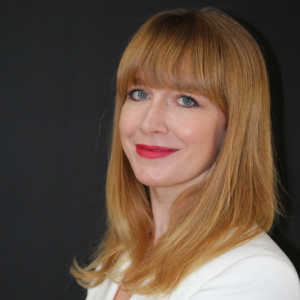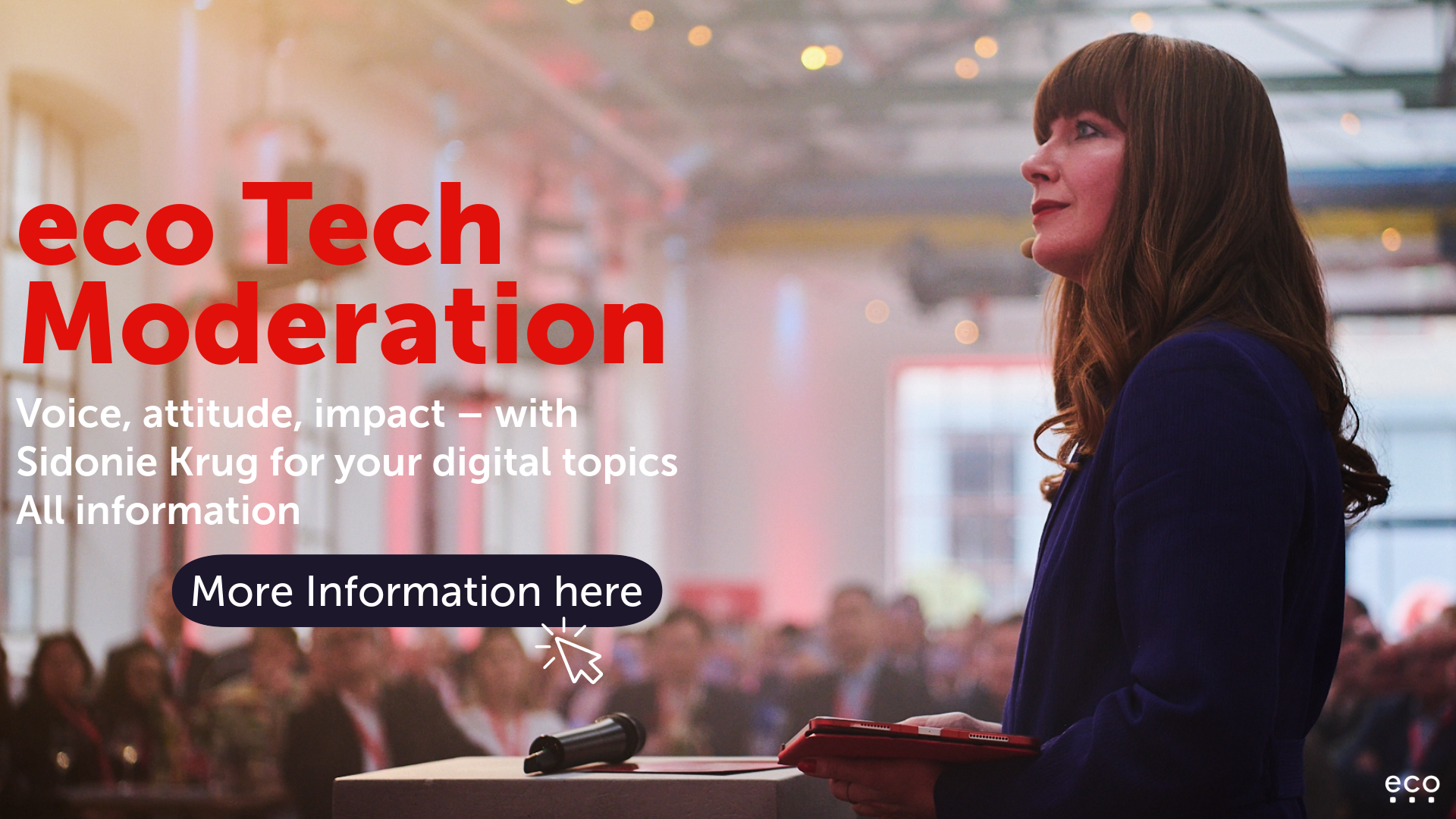
Sidonie Krug, Member of the Management Board and Head of Association Communications at the eco Association, is a Deutschen Moderatorenakademie certified professional moderator for live events from the German Moderators Academy. In addition to her personality and years of experience in designing a wide range of event formats, she also brings a wealth of expertise in digital and tech topics. She is available to eco members for booking as a moderator at special rates.
In this interview, she talks about what she considers to be the key to successful moderation, how she supports organisers in planning and implementation, and how she incorporates her training as a systemic coach and moderator into her work.
You have been moderating events and formats in the Internet industry and digital policy for many years. What do you find particularly appealing about moderating in the tech area?
The digital and tech industry is so dynamic – there are constantly new developments, new topics and, as a result, new (political) debates, so it never gets boring. At the same time, digital transformation now affects almost every aspect of our daily lives and the industry. This means that there are always new and exciting aspects and issues that are worth discussing. We are living in a time of ongoing technological change – innovative technologies such as AI are rapidly and disruptively transforming our lives, the way we work and communicate. This raises so many questions, so much social friction around the use of new digital technologies, so much room for different opinions and, at the same time, a need to build consensus, agree on key questions about the future, and establish rules. I find it exciting to be right in the middle of this and, through my moderation, to help people exchange their opinions and experiences – and perhaps even reach agreements on essential questions about the future.
What added value do your tech moderations create in this context?
For me, moderation means creating space for mutual understanding. It is important to me to use my moderation to build a stage on which all participants can engage equally and present their arguments. My focus, however, is never simply on presenting opposing opinions, but always on finding common ground and solutions. As a moderator, I not only provide a clear narrative thread, but also guide the discussion towards its most engaging moments with my questions. I also see myself somewhat as an “advocate” for the audience. Participants in political and tech discussions are mostly experts in digitalisation themselves – I therefore make a point of including their perspectives and questions at suitable moments in the on-stage discussion. After all, I am convinced that almost every topic has its lighter aspects and that almost every debate benefits when there is also room for laughter along the way.
From the briefing to the actual event – what does working with you as a moderator typically look like?
My work doesn’t start just before the event begins – it begins much earlier. As a moderator, I am always the “face” of an event, which means it is naturally in my interest for it to go well and for everyone to go home satisfied at the end. I therefore like to contribute my experience in format design as early as possible in the planning process and, in addition to early dialogue with clients, I also seek contact with the planned guests to ensure I can address all perspectives effectively during the moderation. If desired, I am also happy to contribute my network in the digital and tech industry, help identify and approach interesting panellists, and promote the events through the channels available to me.
You are not only a certified moderator for live events, but also a systemic coach. What advantages does this combination offer for moderating smaller formats, such as internal workshops?
The combination of moderation and systemic coaching enables me to design workshops that are not only structured, but also people-centred and goal-oriented. As a coach, I listen between the lines, recognise dynamics in the room, and bring along a well-stocked toolkit of suitable methods. This fosters openness, encourages genuine dialogue, and leads to sustainable results. At the same time, as a moderator, I keep the thread running and ensure that the group reaches solutions efficiently and with clarity. This creates a setting where both structure and genuine collaboration have their place.
How do real-time formats differ from audiovisual recordings? What, for example, should be considered in podcasts and video recordings? And what expertise do you bring to the table here?
Real-time formats thrive on direct interaction – on spontaneity, energy and the moment. Podcasts and video recordings, on the other hand, require greater awareness of structure, language and atmosphere, as there is no live dynamic. Here, I pay particular attention to clear dramaturgy, precise wording and an authentic yet focused presence. Small pauses, tone of voice and gaze direction take on greater importance, as they shape how content is perceived later. The goal is to create a sense of closeness and vitality even in recorded formats – as if the audience were there live. I have been hosting the eco podcast Das Ohr am Netz (“The Ear on the Internet”) for around three years, have produced various video formats for online and social media channels for the eco Association, and therefore bring the necessary expertise and experience.

